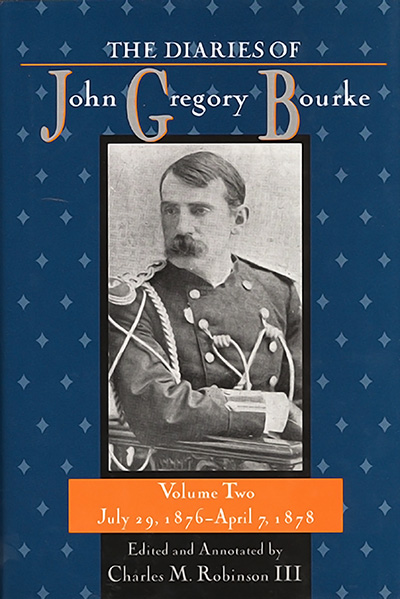
October, 2005
Published
608
Pages
25 b&w photos. 2 maps. App. Notes. Bib. Index.
Features
About Robinson III's The Diaries of John Gregory Bourke Volume 2
John Gregory Bourke kept a monumental set of diaries beginning as a young cavalry lieutenant in Arizona in 1872, and ending the evening before his death in 1896. As aide-de-camp to Brigadier General George Crook, he had an insider’s view of the early Apache campaigns, the Great Sioux War, the Cheyenne Outbreak, and the Geronimo War. Bourke’s writings reveal much about military life on the western frontier, but he also was a noted ethnologist, writing extensive descriptions of American Indian civilization and illustrating his diaries with sketches and photographs.
Previously, researchers could consult only a small part of Bourke’s diary material in various publications, or else take a research trip to the archive and microfilm housed at West Point. Now, for the first time, the 124 manuscript volumes of the Bourke diaries are being compiled, edited, and annotated by Charles M. Robinson III, in a planned set of six books easily accessible to the modern researcher.
This volume opens as Crook prepares for the expedition that would lead to his infamous and devastating Horse Meat March. Although Bourke retains his loyalty to Crook throughout the detailed account, his patience is sorely tried at times. Bourke’s description of the march is balanced by an appendix containing letters and reports by other officers, including an overview of the entire expedition by Lt. Walter Schuyler, and a report by Surgeon Bennett Clements describing the effects on the men. The diary continues with the story of the Powder River Expedition, culminating in Bourke’s eyewitness description of Col. Ranald Mackenzie’s destruction of the main Cheyenne camp in what became known at the Dull Knife Fight. With the main hostile chiefs either surrendering or forced into exile in Canada, field operations come to a close, and Bourke finishes this volume with a retrospective of his service in Tucson, Arizona.
Extensively annotated and with a biographical appendix on Indians, civilians, and military personnel named in the diaries, this book will appeal to western and military historians, students of American Indian life and culture, and to anyone interested in the development of the American West.
“The Bourke diaries are of great significance to the fields of Western American history and of Native American Studies. They are an unparalleled source on the internal operations of the Indian-fighting army and on ethnohistorical information on the tribes that Bourke came to know.” —Joseph Porter, author of Paper Medicine Man
“The University of North Texas Press deserves the thanks of all those interested in the North American Indian wars for undertaking the publication of this invaluable primary source.” —Journal of Military History
“Robinson merits high praise for the herculean task of transcribing the entire diaries and remaining as faithful to the original text as possible. Publication of the series will be extremely useful for scholars of western America.” —Robert Wooster, author of The Military and United States Indian Policy 1865-1903
“The availability of the complete Bourke diaries, effectively presented and enhanced by Robinson’s introductory remarks, footnotes, and appended materials, is a milestone contribution to the field of western history and Indian wars research.” —Jerome A. Greene, author of Battles and Skirmishes of the Great Sioux War
About the Editor
CHARLES M. ROBINSON III received his bachelor’s degree from St. Edward’s University and master’s from the University of Texas-Pan American, and was a history instructor at South Texas Community College. He wrote more than twelve books, including Bad Hand: A Biography of General Ranald S. Mackenzie (T.R. Fehrenbach Award) and The Court Martial of Lieutenant Henry Flipper (Spur Award finalist). Robinson appeared on television documentaries for the Public Broadcasting System and the History Channel.
Buy Now
The Diaries of John Gregory Bourke Volume 2: July 29, 1876-April 7, 1878
608 pp. 25 b&w photos. 2 maps. App. Notes. Bib. Index.